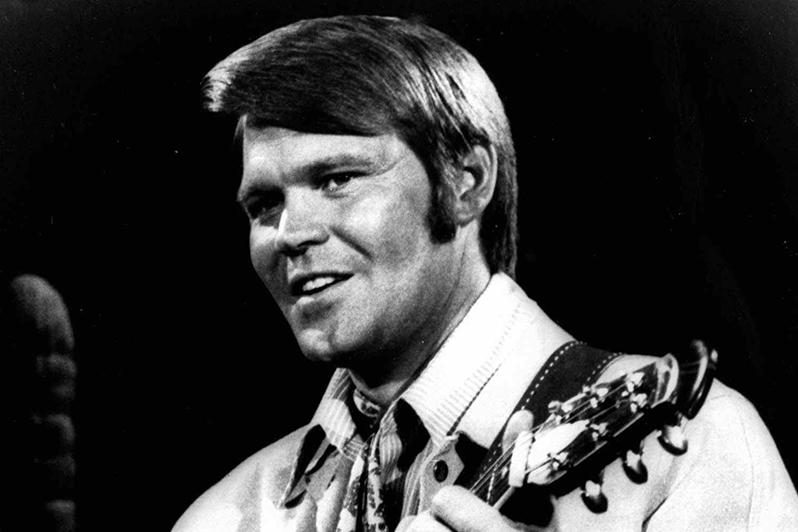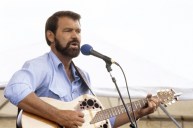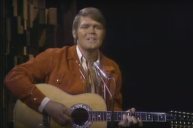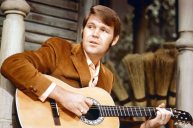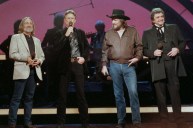When Glen Campbell passed away in 2017, longtime fans and casual listeners reminisced online about the handful of greatest hits that defined a globally revered popular musician and helped bring him to the top of the country music scenes on the West Coast and in Nashville.
Many of his fans' tribute tweets and farewell posts mentioned "Southern Nights," "Rhinestone Cowboy," "Gentle on My Mind" and other country and pop hits that helped make Campbell a legend in his own time.
The most intriguing selection on many fans' shortlist was "Galveston," an anti-war song written by Jimmy Webb. Campbell recorded quite a few of Webb's compositions over time, from near-perfect pop hits "Wichita Lineman" and "By The Time I Get to Phoenix" to a version of "Highwayman" that predates supergroup the Highwaymen's Grammy-winning recording. Beyond Campbell's hits, Webb pretty much co-wrote the '60s and '70s for country and pop vocalists. His other notable credits include "Where's the Playground Susie," "MacArthur Park," and "Up, Up and Away."
By making the song pop-accessible without watering down Webb's pertinent message, Campbell created something more than a number one hit on Billboard's Hot Country Songs and Adult Contemporary charts. He also immortalized what's become an unofficial theme song for the city of Galveston, Texas.
A Statement of Protest
A Baptist preacher's son, Webb grew up traveling between churches in Oklahoma and Texas. The beauty of coastal visits impressed young Jimmy, who'd revisit images of crashing sea waves and soaring sea birds when penning "Galveston." The song crosses Webb's love of seaside Texas with the folk revival's growing catalog of Vietnam War protest songs.
Webb wrote the song as a slow tempo weeper about a young soldier separated from his first love. In one line that changed over time, the scared and lonely soldier puts down his gun when memories of his partner become overwhelming. It's a moving thought, one that takes the focus off politicians and protesters and puts it on the fears and struggles of the young servicemen plucked right from their hometowns. Per Webb, it's "about a guy who's caught up in something he doesn't understand and would rather be somewhere else."
Glen Campbell's Revised Standard Version
Husky voiced Hawaiian Don Ho first recorded the song in 1968, staying true to Webb's lyrics while introducing an orchestral pop element to please easy listening fans. During an appearance on Campbell's Goodtime Hour variety show, Ho suggested that the singer cut a country music version.
Campbell went on to make Webb's song legendary, but not without changing its tempo and lyrical content. The upbeat feel of Campbell's 1969 interpretation changed a commentary on the times to a patriotic song. Webb's arrangement plays up the sadness of a young man as he pines for his lover's dark eyes. In Campbell's version, the song found the same soldier proudly protecting his girlfriend's freedom. Instead of putting down his gun, Campbell's soldier cleans it while using memories of home as motivation to remain brave. Webb used Campbell's lyrics for future performances and recordings, so he must not have minded the change.
A promo video for Campbell's recording shows him in a military outfit, casting him as the song's all-American narrator. Even with his changes to the song's general message, it remains a poignant reminder of the relationships put on hold when young men got drafted into the war. Few people of a certain age made it through this period without a friend, classmate, or relative facing the same challenge, making this a sad and relatable country hit in its time.
A Time-Tested Hit
Campbell's version was an instant success, netting RIAA gold certification the year of its release. Its global popularity transcended Houston area homerism and American patriotism. It topped the charts in Canada and gained traction in the UK, New Zealand, and Australia.
Despite his level of fame, Campbell needed the right songwriter's lyrics to continue his run of late '60s success. Even with the tone and lyrics changed, "Galveston" still touches listeners today because of its writer's skill in speaking on behalf of a common soldier, with or without that original spirit of protest. Although Campbell made it less blatantly a statement against the war than the Creedence Clearwater Revival songs that blare in every period-specific film or documentary, "Galveston" remains one of many lasting cultural references to the war's impact on the home front.
Campbell's musical dream of Galveston got honored during CMT's 2003 special on country music's 100 greatest songs. An orchestral version was performed that night by Campbell and one of the great stars he inspired, Steve Wariner.
Now Watch: Do You Remember These Dolly Parton Movies?
This article was originally published on May 6, 2020.
